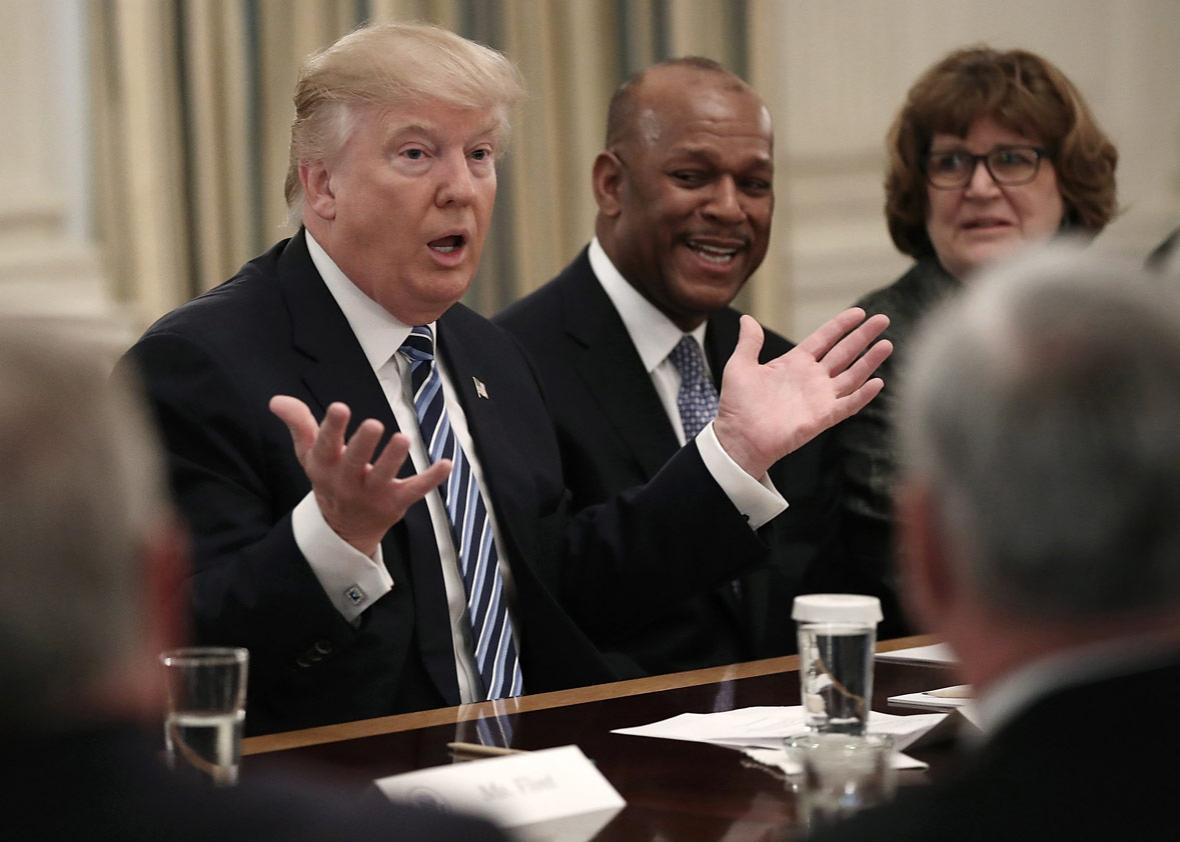There are two things wrong with President Trump’s claim that Senate Democrats are delaying confirmation of his Cabinet picks. First, it’s not true; the pace of hearings, probes, and votes has been about the same as in previous administrations. Second, if Trump is suggesting that the delays are preventing his government from revving up, he’s the one to blame.
Three weeks into his presidency, Trump has not nominated any second-tier officials—the deputy, under, and assistant secretaries—in a major department. Whatever the merits of his various Cabinet secretaries, they are heading empty shells.
Yes, Secretary of Defense James Mattis flew to Asia to assure his counterparts in South Korea and Japan that America’s commitment to their defense is rock solid (despite some of Trump’s remarks to the contrary). Secretary of State Rex Tillerson reinforced that message with phone calls himself.
But then what? Traditionally, the appropriate underlings—the undersecretary of state for political affairs, the assistant secretary of defense for Asian and Pacific security affairs, and various others—would follow up, in phone calls and face-to-face meetings, to discuss specific issues, allay specific concerns, reshape imperfect accords, untangle some misunderstandings. Asian allies in particular require almost daily hand-holding.
But none of this can happen, because there are no officials who can do it. Nor can the Trump administration do much to form new policies, assess new trends, or address new threats. Usually, the National Security Council’s Deputies Committee does the staff work—sometimes the initial analysis—on these sorts of issues. But it can’t be done now, because there are no deputy or undersecretaries to fill a Deputies Committee. There are acting deputy and undersecretaries, but they’re holdovers from the Obama administration, and so, they can’t pretend—or be trusted—to speak for the new crowd. They tend to be junior hangovers, at that, since most of Obama’s midlevel officials left on Inauguration Day, either by their own choice or at Team Trump’s insistence.
Officials at this level are presidential appointees, and the slots are usually filled—at least tentatively (for they, too, require Senate confirmation)—in the transition between the election and the start of the term. Some presidents give Cabinet secretaries leeway to pick their own underlings or to reject the ones offered, but only to a degree and sometimes barely that. Presidents don’t want a Cabinet that’s too independent; putting their own people in key positions is one way to maintain control. In this administration, Mattis has pushed back on several of Trump’s preferred undersecretaries, and he may be the only Cabinet secretary with the moxie and leverage to do so. The others are still waiting.
Ordinarily this delay in staffing wouldn’t much matter. New administrations take some time to find their footing; crises rarely occur so early on. But Trump has been spawning mini-crises almost daily. With nearly every phone call to a foreign head-of-state comes a tantrum, a faux pas, or at very least a storm of confusion that heightens tensions or foments new uncertainties. Usually, before presidents call a head of state, they’re briefed on the major issues concerning that country, the positions held by both sides, perhaps some personal peculiarities. For heads of particularly important countries, they’re given briefing folders to read in advance. Trump reads no such folders and hears no such briefings, except sometimes an informal point or two, delivered not by a State Department official, but by his national security adviser, retired Lt. Gen. Michael Flynn, who, in some cases, has his own agenda and, in others, has little to say.
Several foreign leaders have shaken their heads in wonder at these phone calls, so hostile or, in any case, bewildering. French President François Hollande told aides that all Trump seemed to care about was the money that America spends on the rest of the world. Trump famously screamed at Australian Prime Minister Malcolm Turnbull over a prior deal for the United States to receive 1,200 refugees—in part because Trump didn’t know about the deal and, on a broader level, had no knowledge of the critical role that Australia plays in Asian security or in the global U.S. intelligence network. In another phone call, when Russian President Vladimir Putin asked about extending the Obama-era New START nuclear-arms-reduction treaty, Trump scoffed at the treaty as a bad deal that gives Moscow an advantage—in part because he was unfamiliar with the treaty, which in fact requires both sides to cut their nuclear arsenals to equal levels and which, meanwhile, gives the United States unprecedented rights of inspection.
It’s not clear whether Trump would have wanted a State Department briefing on these subjects, had one of his own people been available to give it. But he had no such people, and there were no briefings.
Trump is right about one thing: The world is a mess. He doesn’t seem to realize the extent to which his words and actions—his hostile messages, mixed messages, and sometimes the absence of a message where there needs to be one—are making it messier. He knows almost nothing about foreign policy. He has no foreign-policy apparatus, only a few Cabinet secretaries and some White House advisers, who have little experience running federal bureaucracies and who disagree on basic premises. In short, he has no foreign policy, but only a string of clichés about “America First” and “winning,” which don’t translate into substantive ideas or prescriptions for action. And he seems blithely unaware that he’s spinning aimlessly.
